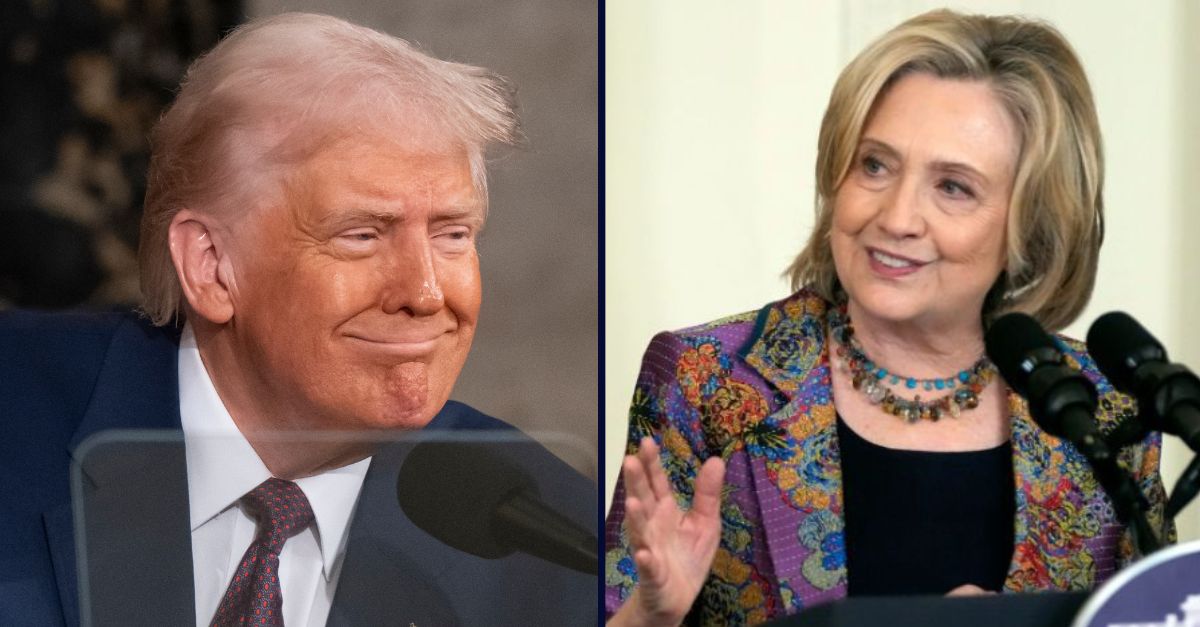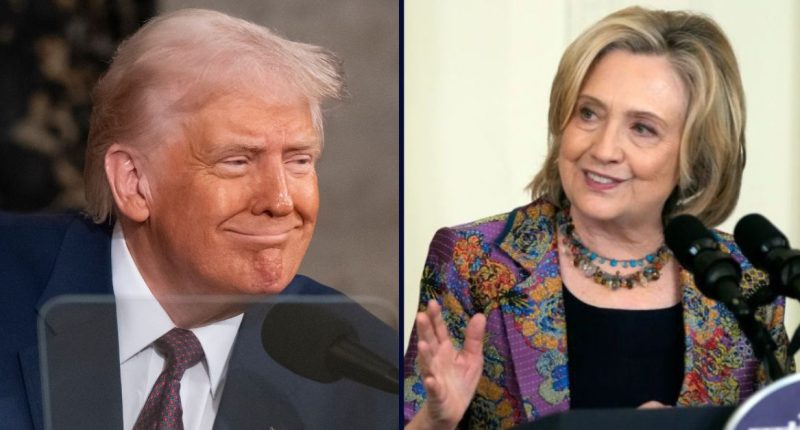
Left: President Donald Trump addresses a joint session of Congress on Capitol Hill in Washington, Tuesday, March 4, 2025 (AP Photo/Alex Brandon). Right: Right: Hillary Clinton speaks during an event with first lady Jill Biden to celebrate the 2023 Praemium Imperiale Laureates in the East Room of the White House, Tuesday, Sept. 12, 2023 (AP Photo/Alex Brandon).
The Trump administration on Wednesday implored a federal judge in Washington, D.C., to dismiss a lawsuit filed by Perkins Coie which accuses the president of unlawfully targeting the Hillary Clinton-linked law firm in an executive order last month as retaliation for its representation of his perceived “political enemies.”
That executive order has already been subject to a temporary restraining order after a judge found that Perkins Coie was likely to succeed on its claims that Trump’s order violated the First and Fifth Amendments and was clearly “retaliatory” in nature.
In a 34-page motion to dismiss, the Justice Department asserts that Trump’s order merely lays out his “concerns” about Perkins Coie “in matters related to election integrity, national security, and discriminatory employment practices.”
“The Executive Order directs agencies to do what they should already be doing, declines to contract with entities who act inconsistently with valid social policies regarding discrimination, and calls for the lawful examination of security clearances and government access of employees of Plaintiff’s firm,” the motion states.
Perkins Coie last month sued the administration over Trump signing the March 6 executive order, entitled “Addressing Risks From Perkins Coie LLP,” in which he accused the firm of “undermining democratic elections” and engaging in racially discriminatory hiring practices. The order also purports to suspend security clearances for Perkins Coie employees, bar them from accessing government buildings, and terminate any contracts the firm may have with the government.
The firm responded the following week by filing a 43-page complaint alleging that the order was unconstitutional.
“The Order is an affront to the Constitution and our adversarial system of justice,” the complaint states. “Its plain purpose is to bully those who advocate points of view that the President perceives as adverse to the views of his Administration, whether those views are presented on behalf of paying or pro bono clients.”
The complaint also accuses the administration of violating the separation of powers by effectively deciding that the firm had engaged in “misconduct,” then imposing punishments “ex post facto” without giving Perkins Coie or its employees the chance to contest the “false and disparaging claims” made against them.
But the administration responded by arguing that the conduct of Perkins Coie and its employees is the reason Trump issued the order, claiming it is within the president’s authority to issue while also rejecting the assertion that Trump was following through on threats to go after his political enemies and those he believes work against his agenda.
“Plaintiff’s 172-paragraph complaint raising nine separate legal claims only obscures what is a straightforward — and straightforwardly legal — Executive Order. Try as it might to frame the Executive Order as ‘punitive’ or a ‘sanction,’ the preamble in Section 1 and the operative sections of the Executive Order, Sections 2, 3, 4, and 5, act within the bounds of established executive authority,” the filing states. “Plaintiff might dislike how Defendants would exercise that authority under the Executive Order, but that does not make Defendants’ actions ultra vires.”
The administration further argued that siding with Perkins Coie in the matter would set a dangerous precedent of silencing the president.
“Plaintiff’s lawsuit carries with it a dangerous risk of muzzling the Executive,” the motion states. “No less than Plaintiff, the government has a right to speak.”
Since taking office, Trump has used executive orders to target numerous law firms that have employed individuals involved in investigating his alleged criminal conduct as well as firms that have represented clients suing his administration. While some, such as Perkins Coie, have fought the president in court, others moved quickly to strike a deal with the administration for pro bono work to bolster Trump’s political agenda.
Earlier this week, Willkie Farr & Gallagher agreed to cut its DEI programs and to provide the Trump administration with at least $100 million in free legal services in exchange for the president withdrawing a similar executive order targeting the firm. Similar agreements were reached last month with the law firms Paul, Weiss and Skadden Arps.
In addition to Perkins Coie, the law firms Jenner & Block and WilmerHale have also sued the administration over executive orders.
Love true crime? Sign up for our newsletter, The Law&Crime Docket, to get the latest real-life crime stories delivered right to your inbox.







